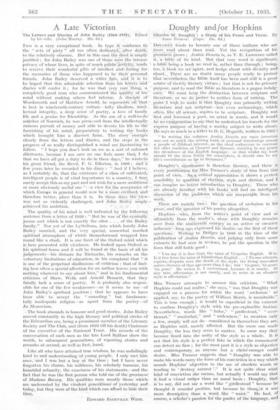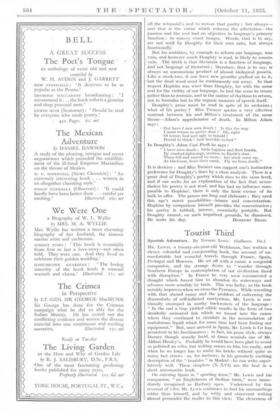CharieS* Doughty a Siiidy of his Prose and Verse. BS
Dovclssx tends to become one of those authors who are more read about than read. Yet the recognition- of his greatness grows ; Arabia Deserta is, as Y. E. Lawrence called it, a bible:of its kind. But that' Very word is significant,' a bibTC`be'ing. a book we read in,* rattier than through ; being, too, 'a. iibofc.4e 'set -4'6,A, and hedge about with divinity and ritual... There are no doubt many people ready to protest that neverthelesS the Bible itself has been and still is a great sotisee.of ineiely literary virtues ; but that is not its primary purpose, and to read the Bible as literature is a pagan indulg- ence. We ihust keep sthe distinction between scripture and literature, or we dOjiritice to neither form of writing. The point-1 with to nitrite that Doughty was primarily writing literature ands not •Scripturenot even archaeology, which often, like all science, aspires to be scripture. Doughty was 'first and ibrerriOSt a poet, an artist in words, and it would be no say that he undertook his travels for the express purpose of having a worthy subject to write about. He says as much in a letter to D. G: Hogarth, written in 1902 : • • ` In writaig"the voltimos Arabia Deseka my main intention was .not so much the setting forth of personal wanderings among a people of-Biblical- inferest,..as- the ideal ondetiVeia4,to continue the older tradition of Chaucer and Spenser, resisting to my power the decadence of the tpglish language : so that whilst any 'a 0111 should be the lien Verity for orientalists, it should also he any
life's contribution so far to literature." • •,.
Doughty's significance is therefore literary, and there is • - every justification for Miss Treneer's study of him from this point of view.. -Art a, critical appreciation it shows a perfect
•
sensibility to qualities of rhythm, style and diction, and I can imagine no better introduction to Doughty. Those who • are already familiar with his bOokS will find an intelligent _ . discussion bi- the 'Problems which arc inseparable from his work._ .
These are mainly two : the question of archaism in his . s _ prose, and the question of his poetry altegether: I lopkinswho, from the writer's point of view and so el y from the .reader's, alone with Doughty remains over from the nineteenth century as an active or creative influence.-long agosexpressed -his doubts on the first of these questions..• Writing to Bridges in 1888 at the time of the publication. of Arabia Deserta, and judging only from some extracts lie had seen in reviews, he put the question in the form that still holds good : " You say it is free from the taint of Victprian English. Han. Is it free from the taint of Elizabethan English . . . 7 No one admires, regrots,"dospairs over the death of the style, the living masculine native rhetoric of that ago more than I do ; but "tis gone, 'tis gone, 'tie gone.' He writes it, I understand, because it is manly. At any rate, affectation is not manly, and to write in an obsolete style is affectation."
Miss Treneer attempts to answer this criticism. " 'What Hopkins could not realise," she says, -" was that Doughty was engaged on a process for which the word ' archaism' as applied, say, to the poetry of William Morris, is unsuitable." This is true enough ; it would be superficial in the extreme to confuse Doughty's style with the pre-raphaelite fustian. Nevertheless, words like " liaise," " girdlestead," ' over- thwart," " mostwhat," and " widewhere," to mention only a few, simply will not do—considered in themselves they are, as Hopkins said,. merely affected. But the more one reads Doughty, the less they seem to matter. In some way they become, fused into the unity of the style as a whole. It is not that his style is a perfect fake in which the connoisseur can detect no flaw ; for the most part it is a style as objective and contemporary, as anyone but a cliche-monger could desire. Miss Treneer suggests that " Doughty was able to make his words carry the force of his conviction in a way which annuls Hopldnif objection to the use of obsolete words as tending to ' destroy earnest '." It is not quite clear what kind of conviction she means, but actually I. would say, that it-had a -visual rather than an aural basis ; .• Doughty, that is"to say, did not use a word like " girdlestead " because he thought it sounded prettier, but because he thous,:it it was more dcsetiptive than a word. like " waist." He had, of course, a scholar's passion for the purity of the language, and all the reformist's zeal to restore that purity ; but always- and that is the virtue which redeems the affectation-the passion and the zeal had an objective in language's primary function : to convey exact images. Words, that is to say, are not used by Doughty for their own sake, but always functionally: But his ambition, by example to reform our language, was vain, and -however much. Doughty is read, is likely to remain vain. The troth is that literature is a function of language, and not language of literature ; literature, that is to say, is always an unconscious product of almost biological growth. Like a stock-tree, it can have new growths grafted on to it, 7but the dead wood must be continuously cut away. In that respect Hopkins was wiser than Doughty, for with the same zeal for the virility of our language, he had the sense to create rather than to recreate, and in the matter of rhythms to return, not to formulas but to the organic measure of speech itself.
Doughty's prose must be read in spite of its archaism ; what of his poetry ? Miss Treneer quotes a very effective contrast between his and Milton's treatment of the same theme-Adam's apprehension of death. In Milton Adam says :
But have I now seen death ? Is this the way I must return to native dust ? Oh, sight Of terror, foul and ugly to behold ! Horrid to think ! how horrible to feel."
In Doughty's Adam Cast Forth he says : " I have seen death ; birds fugitive and fleet beasts, By crooked lightnings, smitten to Earth's dust. Those fell and moved no snore but stink came up, As blackness, from their earth. Fly we from death."
It is decisive ; and Miss Trcneer can support one's instinctive preference for Doughty's lines by a close analysis. There is a 'great deal of DoughtY's poetry which rises to the same level, and if one seeks for an explanation of the fact that never- theless his poetry is not' read, and has had no influence com- parable to Hopkins', there is only the lame excuse of its bulk to offer. The poems are long and elaborate ; they need this age's rarest possibilities-leisure and concentration. Hopkins by comparison himself provides the concentration ; his poetry is tabloid, intense, essentially portable. But Doughty cannot, on such impatient grounds, be dismissed.































































 Previous page
Previous page